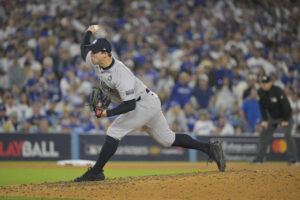There are a plethora of reasons why we, as sports fans, celebrate comebacks. There are just as many reasons for why these comebacks exist in the first place. Some are built upon the dogged determination of a team with nothing left to lose. Others are circumstantial, with elements beyond the field playing a crucial factor in these gladiatorial battles. Then, there are the wild, wacky, and just plain weird comebacks that stick in our minds. For example, as an Atlanta Braves fan, this writer is always reminded of the 2010 Brooks Conrad grand slam. If it weren’t for the wild ineptness of the Cincinnati Reds’ infield defense, the Braves may well have been mired in another losing effort. However, thanks to key errors, they were able to come back.
Satisfying as that may be to talk about, we have other business to attend to. Namely, returning to a mid-June day in 1925 for a game that definitely falls into the “wild and wacky” category. It’s a game that features one Hall of Famer in his very first big league stretch and another in the twilight years of his career. One team outhit the other one 24–19 and still lost the game. Nevertheless, the biggest reason that it belongs in this particular category of comebacks is the 13-run eighth inning posted by the eventual victors. So let’s dive in, and examine just how this particularly interesting set of circumstances came to be.
June 15, 1925: Philadelphia Athletics vs. Cleveland Indians
In 1925, the Philadelphia Athletics were a franchise still seeking an identity. Far removed from their success of the early 1910’s, they were finally starting to turn things around once more. In fact, 1925 would be their first winning season since 1914. Hall of Fame manager Connie Mack had the team in a good spot in mid-June. They were 34-18, holding a half-game lead on the Washington Senators for the top spot in the American League. Hall of Famer Al Simmons, in his second full year, was already leading the team offensively. They had another young player named Jimmie Foxx who was showing promise. He’d only play in ten games that season, but he’d go on to wallop more than 500 home runs and wind up in Cooperstown. On the mound, the team was led by 20-game winner Eddie Rommel. So, things were looking up for the Athletics.
The 1925 Indians: Offensive Heroes vs. Bullpen Woes
Meanwhile, the Cleveland Indians were on the fast track to nowhere. After winning the World Series in 1920, they entered an 18-year stretch with no postseason appearances. The 1925 squad was no different, although they probably weren’t as terrible as some others. In mid-June, they held a respectable 26–26 record. This put them eight games out of first place. However, this doesn’t mean that they were completely devoid of exceptional talent. Far from it, in fact, as they were led by Hall of Fame player/manager Tris Speaker. Fellow Cooperstown member Joe Sewell held down the fort at shortstop. Their offense hit .297 which, in 1925, was only good enough for fifth in the league. Despite this offensive production, their pitching posed a massive issue. Staff ace Sherry Smith only won 11 games with an ERA near five. The bullpen was a disaster, only posting one save with two regular pitchers having ERA’s over six.
An Unlikely Beginning
This would come back to bite the Indians in this particular contest. The game began much like many, with a one-two-three top of the first courtesy of Athletics’ starter Rommel. The Indians sent Jake Miller out for the bottom of the first. He walked leadoff man Max Bishop and gave up a hit to left fielder Bill Lamar. Other than that, the inning remained uneventful. It was in the second inning where Rommel ran into trouble. The Indians plated two runs thanks in no small part to a wild pitch Rommel delivered to his counterpart Miller. That was enough for Connie Mack, who pulled the plug and inserted Stan Baumgartner into the fray. The reliever went on to give up two more runs before finally getting Speaker to pop out and end the misery. The Athletics managed to score a run in the bottom of the inning, but that was it.
The Dominance Continues
Mack once again turned to his bullpen, putting Fred Heimach in. However, he ran into trouble immediately. Back-to-back home runs by Sewell and Glen Myatt to lead off the third made it 6–1. Meanwhile, the Athletics kept plugging away, scoring a second run in the bottom of the frame. The Indians didn’t let up, plating two more in the fourth and then four in the fifth off of new Athletics pitcher Art Stokes. By this point, the score was 12–2 and the game was only halfway over. Mack put Tom Glass into the game, and he managed to right the ship a bit. Despite giving up three more runs, he gave the Athletics what they really needed: a chance. By the time the eighth inning rolled around, the score was 15–4. Things looked bleak for Philadelphia, but then they pulled out their humongous offensive guns.
Comebacks for the Ages: An Eighth Inning Meltdown
Speaker had left Miller in the game up to this point. Then, as is so often the case, he walked the lead-off batter, Chick Galloway. Glass flew out, and became the first retiree of the inning, then Max Bishop walked. Jimmy Dykes then tripled, causing these walks to come home to roost. That’s when the floodgates opened as Speaker turned to his destructive bullpen. By Speece came in and promptly gave up four consecutive singles. The score was now 15–9. This writer can practically imagine the beads of sweat beginning to form on Speaker’s face as he was forced into another pitching change. This time, it was Carl Yowell who was called upon. He issued the third walk of the inning followed up by a Galloway single that scored two more.
With the lead slipping away, Speaker yet again went to his relief corps. By this point, they were looking more like amateurs than professionals. George Uhle came in and gave up hits to Sammy Hale and Bishop, thus cutting the lead down to one. Mercifully for the Indians, the second out was finally recorded right afterwards. It appeared that they might have a chance to exit the inning while retaining the advantage. However, the Athletics weren’t done with the frame’s shellacking which, at this point, stood at ten runs. After Lamar was issued the fourth walk of the inning, Simmons launched a three-run homer, giving the Athletics a 17–15 lead. Their 13-run eighth inning comeback was complete. Closer Rube Walberg had an uneventful ninth, and the Athletics picked up their 35th win of the year.
Comebacks: Never Leave the Park Early
The Athletics entered the eighth inning with a zero-percent chance to win the game. They left with a 91% chance to win. Their lowest win expectancy, according to Baseball Reference’s list of comebacks, was 0.03%. If there ever was a game that proves that fans should never leave the ballpark, it is this one. For, even in that late stage of the contest, the Athletics were not in the business of giving up. Impressive comebacks can happen at any time, and this is one of the biggest. Frames of 13 runs may be rare, but they are always fascinating case studies in the sport of baseball. Truly, there is never a time when throwing in the towel is ever an option.
Main Photo:
Embed from Getty Images
Players Mentioned:
Brooks Conrad, Al Simmons, Jimmie Foxx, Eddie Rommel, Tris Speaker, Joe Sewell, Sherry Smith, Jake Miller, Max Bishop, Bill Lamar, Stan Baumgartner, Fred Heimach, Art Stokes, Tom Glass, Chick Galloway, Jimmy Dykes, By Speece, Carl Yowell, George Uhle, Sammy Hale, Rube Walberg, Connie Mack






